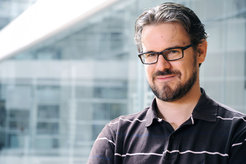European Research Grant for Ivan Matic
Uncovering the letters of the cell’s alphabet
Ivan Matic, Research Group leader at the Max Planck Institute for Biology of Ageing and the CECAD Excellenscluster for Ageing Research, was awarded with the prestigious Consolidator Grant of the European Research Council (ERC). In his project he investigates how the cell determines the fate of specific proteins using tags, the so called post-translational modifications.

Post-translational modifications (PTMs) are small chemical flags, added to proteins in order to modulate their function. They act as letters of a coding alphabet that the cell can use to determine what to do with a specific protein. In his ERC-funded project “nbPTMs”, Matic seeks to develop an advanced technology to fully explore the alphabet the cell uses for sending internal messages through an elaborate protein language.
“This grant means a lot to me, because for the next five years it will allow me to focus on interdisciplinary frontier research”, says Ivan Matic.
The awardee
Ivan Matic obtained his PhD in Biochemistry under the supervision of Matthias Mann at the Max Planck Institute for Biochemistry in Martinsried, Germany. After his stay as a Sir Henry Wellcome Postdoctoral Fellow with Ron Hay at the University of Dundee, Scotland he was appointed as Research Group Leader at the Max Planck Institute for Biology of Ageing and CECAD in 2014. In 2018 he was selected as an EMBO Young Investigator. Matic is also the head of the Proteomics Core Facility at the Max Planck Institute for Biology of Ageing.
The European Research Council
The European Research Council, set up by the European Union in 2007, is the first European funding organisation for excellent frontier research. Every year, it selects and funds the very best, creative researchers of any nationality and age, to run projects based in Europe. „ERC Consolidator Grants are designed to support excellent Principal Investigators at the career stage at which they may still be consolidating their own independent research team or programme. Applicant Principal Investigators must demonstrate the ground-breaking nature, ambition and feasibility of their scientific proposal.“ (European Research Council). The research must be conducted in a public or private research organisation located in one of the EU Member States or Associated Countries. The funding (up to €2 million per grant) is provided over up to five years.
Learn more about the research of Ivan Matic.












